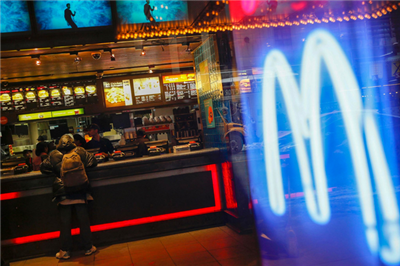McDonald’s said on Wednesday that it would begin using chicken from birds that are not raised with antibiotics used to treat humans.
麦当劳(McDonald's)周三宣布,公司将开始使用在禽类饲养过程中没有摄入人类抗生素的鸡肉。

Because the struggling fast-food chain is one of the largest buyers of chicken in the United States – McDonald’s sells more chicken than beef – the move is likely to have a major impact on the way poultry is raised and the kind of chicken served by restaurants.
由于这家陷入困境的快餐连锁店是美国最大的鸡肉采购商之一——麦当劳出售的鸡肉比牛肉多——此举很可能会对家禽的饲养方式及餐厅提供的鸡肉种类产生重大影响。
The shift toward offering chicken that is largely antibiotic-free is to be phased in over two years, the company said. It also announced that later this year, McDonald’s would give customers the choice of low-fat and chocolate milk from cows that have not been treated with the artificial growth hormone, rBST.
该公司表示,将在两年的时间里逐步改用基本上不含抗生素的鸡肉。声明中还宣布,麦当劳将在今年晚些时候,为顾客提供由未注射人工合成的重组牛生长激素(rBST)的奶牛所产的低脂奶和巧克力奶。
The Centers for Disease Control and Prevention have been increasingly vocal about its concerns about the use of antibiotics in animal husbandry as more and more bacteria and pathogens are showing resistance to such drugs. It estimated in 2013 that at least two million Americans fall sick each year because of antibiotic-resistant infections and at least 23,000 die from them.
随着越来越多的细菌和病原体对抗生素产生抗药性,美国疾病控制与预防中心(Centers for Disease Control and Prevention)越来越明确地表示对此类药物在畜牧业的使用感到担忧。根据该中心在2013年的估算,每年至少有200万美国人因为感染耐药菌而患病,其中至少2.3万人因此死亡。
The government’s concern has caught the attention of consumers, and food companies and restaurants are increasingly using “antibiotic free” labels as a marketing tool that sometimes allows them to command a higher price.
政府的担忧引起了消费者的注意,食品公司和餐厅在越来越多地使用“无抗生素”标签,将其作为一种营销手段,有时候还能因此卖个更好的价钱。
“The last time McDonald’s did something like this, five other fast-food companies made similar announcements within six months,” said Steven Roach, food safety program director for Food Animal Concerns, one of the advocacy groups involved in the coalition Keep Antibiotics Working. “I would expect we’re going to see a similar pattern this time around.”
“麦当劳上次采取类似的举措时,其他五家快餐企业在六个月内发表了类似声明,”食用动物关怀信托组织(Food Animal Concerns)食品安全项目负责人史蒂文·罗奇(Steven Roach)说。“我期待这次也能看到类似情况发生。”该组织是参与“保持抗生素有效”联盟(Keep Antibiotics Working)的倡导团体之一。
The National Chicken Council said in a statement that the “vast majority” of antibiotics used for disease prevention in the industry were never given to humans. “Chicken producers have a vested interest in protecting the effectiveness of antibiotics for the welfare of their animals,” the trade group said. “As such, we’ve proactively and voluntarily taken steps toward finding alternative ways to control disease while reducing antibiotic use.”
全美养鸡理事会(National Chicken Council)发表声明称,业界用于预防疾病的“绝大部分”抗生素都从未用于人体。“为了动物福利而保护抗生素的有效性,符合鸡肉生产商的利益,”该贸易组织表示。“同样,我们一直在主动而自愿地采取措施,寻找在减少抗生素使用的同时控制疾病的替代方法。”
In January, the International Production & Processing Expo, billed as “the world’s largest annual poultry, feed and meat technology exposition,” devoted a panel to antibiotic-free poultry production at which an industry consultant declared that antibiotic-free chicken was no longer a niche business.
今年1月,号称“世界最大的禽类、饲料及肉制品加工技术年度展览”的国际生产与加工博览会(International Production & Processing Expo)专门就不含抗生素的禽类生产问题召开了一次全会。一名业界顾问在会上宣称,不含抗生素的鸡肉不再是一种偏门生意。
“I think in a few years, one-third of chicken and turkey will be antibiotic-free,” Richard Kottmeyer, managing director of Strategic, an agricultural consulting firm, said, according to a report on WATTAgNet.com. “The problem then is the other 66 percent of consumers will be resenting the fact that their chicken isn’t antibiotic-free.”
“我认为在几年之内,三分之一的鸡肉和火鸡肉都将不含抗生素,”根据WATTAgNet.com上的一份报告,农业咨询机构“战略”公司(Strategic)的执行董事理查德·科特迈耶(Richard Kottmeyer)说。“那时的问题将是,剩余66%的消费者将埋怨他们的鸡肉仍然含有抗生素。”
Last September, Perdue became the first major United States poultry company to say it was no longer using antibiotics in its hatcheries, one of the last parts of its production process where the drugs were still in use. A month later, Tyson Foods made a similar announcement, although unlike Perdue, Tyson still uses antibiotics for disease prevention.
去年9月,普渡(Perdue)成为表示不会再在孵化阶段使用抗生素的首家美国大型禽肉公司。孵化是其生产过程中仍在使用这种药物的最后几个领域之一。一个月后,泰森食品(Tyson Foods)发表了一个类似声明,尽管与普渡不同,它仍然在利用抗生素预防疾病。
And a year ago, Chick-fil-A, the fast-growing fast-food chicken business, said it was no longer using chicken treated with antibiotics. Panera has used meat raised without antibiotics for more than a decade.
一年前,发展迅速的鸡肉快餐公司“福来鸡”(Chick-fil-A)宣称,不再使用含有抗生素的鸡肉。Panera面包坊已经使用不含抗生素的肉类产品长达十多年。
McDonald’s is somewhat late to the game, in part because its size makes it difficult to establish supply chains that can fulfill the demand in its 14,000 United States restaurants. It took the company two years, for example, to establish enough contracts to supply it with cucumbers when it added the vegetable to its menu several years ago.
在这件事上,麦当劳的行动有些迟缓。其中的部分原因在于,它的规模十分庞大,难以迅速建立一个供应链来充分满足它在美国的1.4万家餐厅的需求。例如,虽然公司几年前就决定在菜单里加入黄瓜,但花了两年时间才签订了足够的合约来供应旗下的门店。
The company first announced a policy limiting its chicken suppliers’ use of antibiotics in 2003, but it had done little to update it over the years, Mr. Roach said.
2003年,麦当劳首次宣布了一项限制其鸡肉供应商使用抗生素的政策。但罗奇称,在接下来的这么多年里,公司并未采取多少措施来更新这项政策。
The move coincides with McDonald’s “Your Questions, Our Food” marketing campaign, in which the company answers questions like whether the eggs it uses are freshly cracked and how it cooks its beef patties. The company’s new chief executive, Steve Easterbrook, who took the helm this week, successfully used a similar program to help turn around the McDonald’s business in Britain.
新举措与麦当劳的营销活动“你的问题,我们的食物”(Your Questions, Our Food) 同时推出。麦当劳会在这项活动中回答消费者的问题,比如店里使用的鸡蛋是否为刚打破的,或是他们如何烹制牛肉饼。本周刚上任的麦当劳新任首席执行官史蒂夫·伊斯特布鲁克(Steve Easterbrook)曾经利用一个类似项目,成功盘活了麦当劳在英国的业务。
Mr. Easterbrook is meeting this week with McDonald’s franchisees and suppliers to present what he has called the “Turnaround Agenda.” One of the seven “Big Actions” he plans is to “win” with the company’s food by, among other things, improving taste and giving consumers food they can “feel good about” eating, like chicken raised without antibiotics.
本周,伊斯特布鲁克将会见麦当劳的加盟商和供应商,展示他口中的“翻身计划”。他筹划的“七大行动”之一,就是通过多种手段来以食物“取胜”。这些手段中,包括改善口味,以及为消费者提供吃起来“感觉良好”的食物,比如饲养过程中未使用抗生素的鸡肉。













